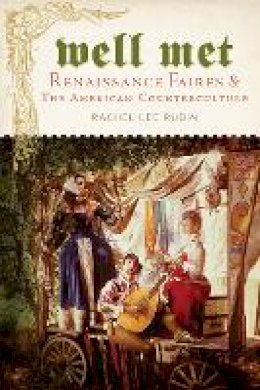
Stock image for illustration purposes only - book cover, edition or condition may vary.
Well Met: Renaissance Faires and the American Counterculture
Rachel Lee Rubin
€ 77.21
FREE Delivery in Ireland
Description for Well Met: Renaissance Faires and the American Counterculture
Hardback. Puts the Renaissance Faire back at the historical centre of the American counterculture Num Pages: 359 pages, 20 halftones. BIC Classification: 1KBB; 3JJP; HBJK; HBLW3; HBTB; JFC. Category: (P) Professional & Vocational. Dimension: 237 x 162 x 26. Weight in Grams: 612.
The Renaissance Faire—a 50 year-long party, communal ritual, political challenge and cultural wellspring—receives its first sustained historical attention with Well Met. Beginning with the chaotic communal moment of its founding and early development in the 1960s through its incorporation as a major “family friendly” leisure site in the 2000s, Well Met tells the story of the thinkers, artists, clowns, mimes, and others performers who make the Faire.
Well Met approaches the Faire from the perspective of labor, education, aesthetics, business, the opposition it faced, and the key figures involved. Drawing upon vibrant interview material and deep archival ... Read more
Product Details
Format
Hardback
Publication date
2012
Publisher
New York University Press United States
Number of pages
359
Condition
New
Number of Pages
359
Place of Publication
New York, United States
ISBN
9780814771389
SKU
V9780814771389
Shipping Time
Usually ships in 7 to 11 working days
Ref
99-1
About Rachel Lee Rubin
Rachel Lee Rubin is Professor of American Studies at the University of Massachusetts Boston. She is author of Immigration and American Popular Culture (with Jeffrey Melnick, NYU Press) and Jewish Gangsters of Modern Literature, and co-editor of American Popular Music: New Approaches to the Twentieth Century and Radicalism in the South since Reconstruction.
Reviews for Well Met: Renaissance Faires and the American Counterculture
Rubin effectively probes how the [Renaissance] fairs exemplify familiar aspects of the American counterculture. She also seeks to illuminate how they are important not only as a forgotten aspect of a completed history but also as vibrant contemporary affairs . . . . They are, for Rubin, spaces of continued counter-cultural activity that, through constant renegotiations of the past, invoke ... Read more
